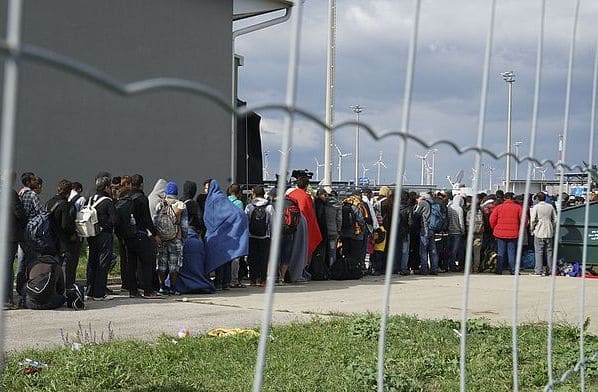In collaboration with the Japan Association for Refugees, JCIE held a symposium, “Why Is Germany Accepting Syrian Refugees? Germany’s Experience and the Implications for Japan,” on December 5, 2015, at Hosei University. The meeting was convened as part of JCIE’s program on Population Decline and Immigration in Japan.
Called the worst refugee crisis since World War II, the Syrian humanitarian disaster has displaced half of the country’s total population of 22 million, and about a third of them, 4.2 million people, have fled to neighboring countries. Hundreds of thousands have been traveling to Europe seeking refuge and many are heading toward Germany. At the beginning of the year, 240,000 Syrian refugees arrived in Germany, and a total of 800,000 refugees from several countries are expected to arrive during the course of the year. Given the apparent challenges and risks, why has Germany continued to welcome refugees? And what lessons can Japan learn from the German experience?
The meeting, which drew about 200 people, began with a message sent from the German ambassador to Japan, in which he expressed his country’s ongoing commitment to welcoming refugees. This was followed by a keynote speech from Andrew Horvat (Josai International University) whose family moved long ago from Hungary to Canada as refugees. He stressed that refugees should not be thought of as a burden but as contributors to their adopted society. He also explained that there are differences of opinion within Europe on the issue of migration and refugees. Eastern Europe tends to be more nationalistic than Western Europe and is therefore more resistant to accepting foreigners. In Japan, he feels that the tendency to demand that foreign workers be able to speak Japanese at a native level and behave like a Japanese person presents an obstacle to their acceptance of foreigners.
The second keynote speech was given by Ryu Kuboyama (Senshu University), who described the evolution of Germany’s policy on accepting immigrants in the postwar era, noting that the country has been successful in utilizing immigration to promote economic growth. Germany’s acceptance of refugees is something that is clearly indicated in its constitution, and its experience in accepting large numbers of refugees at certain points in the past is one factor in their response to the current crisis. Local governments and NPOs have played a major role in receiving refugees in the past, and grassroots organizations are playing an important role this time as well.
A panel discussion followed, featuring Tsutomu Ishiai (foreign news editor, Asahi Shimbun), Yuki Moriya (public information officer, UNHCR), and Eri Ishikawa (chair, Japan Association for Refugees), who offered their thoughts on the German stance toward refugees, touching on the impact that the terrorist attacks in Paris might have for the future policy on refugees. The panelists agreed that refugees should not be automatically associated with terrorism, and the likelihood of a terrorist entering Japan as a refugee is extremely low. The group also discussed the general perception that Japan is accepting too few refugees, the current status of Japanese government discussions on the issue, and the role that UNHCR and NGOs can play by sharing their perspectives on Japan’s refugee policy. Finally, participants discussed possible ways to overcome Japan’s reluctance to accept refugees and immigrants.
The meeting was moderated by JCIE’s Toshihiro Menju (managing director and chief program officer). It was organized in cooperation with the Japan Association for Refugees and supported by the Friedrich Ebert Stiftung.
AGENDA
Opening Remarks
TOSHIHIRO MENJU, Managing Director and Chief Program Officer, Japan Center for International Exchange
Keynote Speech: The Rapid Increase in Refugees and Germany’s Response
ANDREW HORVAT, Josai International University
Keynote Speech: Refugees and German Domestic Affairs
RYO KUBOYAMA, Senshu University
Panel Discussion
Moderator: TOSHIHIRO MENJU
ANDREW HORVAT
RYO KUBOYAMA
YUKI MORIYA, Public Information Officer, UN Refugee Agency
ERI ISHIKAWA, Board Chair, Japan Association for Refugees

